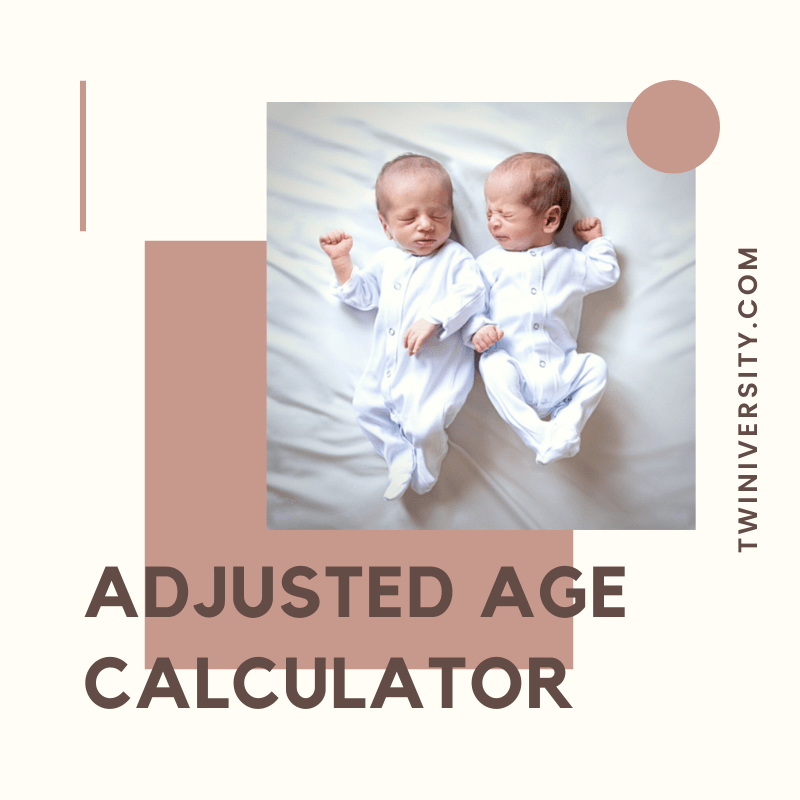Last updated on July 12th, 2024 at 10:58 am



Babies grow and develop at different rates, but what is adjusted age? Adjusted age is the child’s chronological (actual) age minus their number of months and days due to premature birth. The adjusted age calculator will tell you how old your baby really is gestationally speaking. This is helpful in making sure they’re developing as they should be, especially during the average 2 year catch-up period.
This term is common when referring to premature babies as opposed to term babies. Full-term babies never use a gestational age calculator so if you don’t have a preterm baby and haven’t heard this term, there is no need to worry.

What is Adjusted Age?
The term “adjusted” means that we have taken into account some factors that may make premature babies younger than expected, gestationally speaking. You may have heard this phrase when looking into a potential developmental delay with regard to preterm births, low-birthweight infants, multiple births, twins, triplets, etc. We’ve added these extra weeks to the actual age so that our calculations match up more closely with the timeline of your baby’s actual birth. For example, when measuring a baby’s age in weeks, if a baby was born prematurely at 35 weeks gestation when the infant is 9 weeks actual age, they would be 4 weeks adjusted.
Simply put, this calculation subtracts the weeks early the baby was born. Math was never my strong suit, but not to worry, I was able to quickly subtract 7 weeks when calculating my own twins’ adjust age as babies. If I can do it, anyone can.
You can also use this adjusted age calculator by the Neonatal Research Network.
Why Does It Matter to You and Your Baby’s Health?
Adjusted age matters. At least for the first two years of your infants’ life. If you know your baby’s adjusted age, then you’ll know exactly where they stand compared to others who were born around the same time. You’ll know whether they fall behind or ahead of schedule. And you’ll be better prepared to address any issues that might arise during those critical first 2 years.
For instance, we know a two-week-old infant is probably attempting to lift their heads, at least sometimes. If your baby is actually only 1 day old, according to their adjusted age, they might not be doing this for another two weeks. The same is true for how much they eat, how often they sleep, and many other developmental milestones.
Adjusted age also matters when it comes to your infants’ size. The doctor will use their adjusted age to measure their height, weight, and head circumference.
How Do You Calculate Adjusted Age?
Calculating adjusted age is much easier than it seems. You will take the number of weeks premature your infant is and subtract that number from their actual age. You can find an adjusted age calculator online but it’s actually quite simple to do on your own.
If your infant is 17 weeks old but born 5 weeks early, they are 12 weeks adjusted. That means that developmentally speaking, they are only 12 weeks old. It is important to remember that when you are looking at any potential delays.
Your baby’s growth will also be measured according to their corrected age until they “catch up” or turn two. As with all medical questions, defer to your pediatrician when trying to decipher their growth in relation to their term counterparts. In the end, some babies never catch up but are perfectly healthy. As my 4’11” mother always says, there are worse things in life than being small.

Is There a Way to Check if Your Child Is an Average Weight for Their Age?
A quick Google search of average weight for a 7-month-old or a 6-year-old will not give you a full picture of your child’s overall health and we would caution you against doing so. Talk directly to your pediatrician if you have concerns about your child’s weight.
There are many reasons why one would not want to take Google’s word for it. For one thing, “Doctor” Google has no idea what the curve generally over a period of time looks like for your individual child. Believe it or not, that matters. A lot.
It is also important to note that some premature babies never quite catch up, even after the “age out” of using an adjusted age calculator. They may be in excellent health but still small. Google will never be able to differentiate between unhealthy small and healthy but small children. You MUST see your child’s doctor for a truly accurate assessment of health.
For another thing, every child, just like every adult, is different. Genetics, diet, and overall health play a huge role in how seriously you should take the percentile numbers on their own. For instance, a 4’10” 88lb 17-year-old, on her own with no other information, would often be deemed unhealthy. Underweight and obviously suffering from some endocrine system failure. I assure you, this child has seen multiple specialists and had genetic testing to confirm that she is small but healthy and VERY active. Spoiler alert: that child is mine. And she suffers from nothing other than needing a step stool due to her size.
What Are the Benefits of Knowing Your Child’s Adjusted Age, and How Can They Help With Healthy Growth and Development in Children?
Knowing your child’s adjusted age can be extremely beneficial in the first two years of their life. Many parents are all about milestones and growth charts. That seems to be how many new parents and pediatricians measure the health of a child. Taking their adjusted age into account will deter unnecessary panic when it comes to their size and development.
Is your newborn sleeping more than you expected? Take a look at their adjusted age and you will likely find that they are actually awake as much as they should be based on this number. There is a big difference between a 3 week old and a 10 week old. Forgetting about adjusted age will lead to a lot of anxiety when it isn’t really needed. Here at Twiniversity, we are huge fans of telling parents not to worry until a doctor tells them to worry! Keeping adjust age in mind will help you to avoid that extra anxiety.

When Should I Worry About My Child Being Too Old or Young for Activities Like Team Sports?
This question is very difficult to answer because each activity requires its own set of guidelines. The best advice we can offer here is to talk to your pediatrician about any specific concerns you may have. They know your child better than anyone else and can provide guidance regarding appropriate times for various activities. If you do decide to pursue these types of activities, make sure you consult with your pediatrician before starting out. You don’t want to get hurt by participating in something dangerous without proper training.
Generally speaking, when it comes to sports and other activities, adjust age won’t matter much, on its own. By the time your little one is ready to participate in soccer, gymnastics, or tee-ball they will be beyond using adjust age (around 2) and will be developmentally caught up. If you find this isn’t the case for your child, speak to your child’s doctor to see about interventions if needed.
If you have a baby, adjusted age is something you should be aware of. It’s the child’s chronological (actual) age minus their number of months, weeks, and days due to preterm birth. It’s important that you keep track of this information for each milestone stage. Babies grow at different rates and some may not ever completely catch up but are still healthy. Don’t panic if your 11-month-old isn’t walking yet because that could mean he’ll start walking on time according to his adjusted age! If all these adjustments seem confusing, talk to your pediatrician about how best to measure growth and developmental skills over a period of time.
Want to be the first to know about giveaways, deals, and more just for twin parents? Sign up for the Twiniversity email list! Subscribe today to get emails about giveaways, events, weekly article roundups, and more! Pregnant with twins? We’ll be sending you a weekly twin pregnancy email to keep you on track with your pregnancy to-do list! Click here to learn more… and while you’re at it, check out our Complete Baby Safety Course and Twin Parent Memberships.








